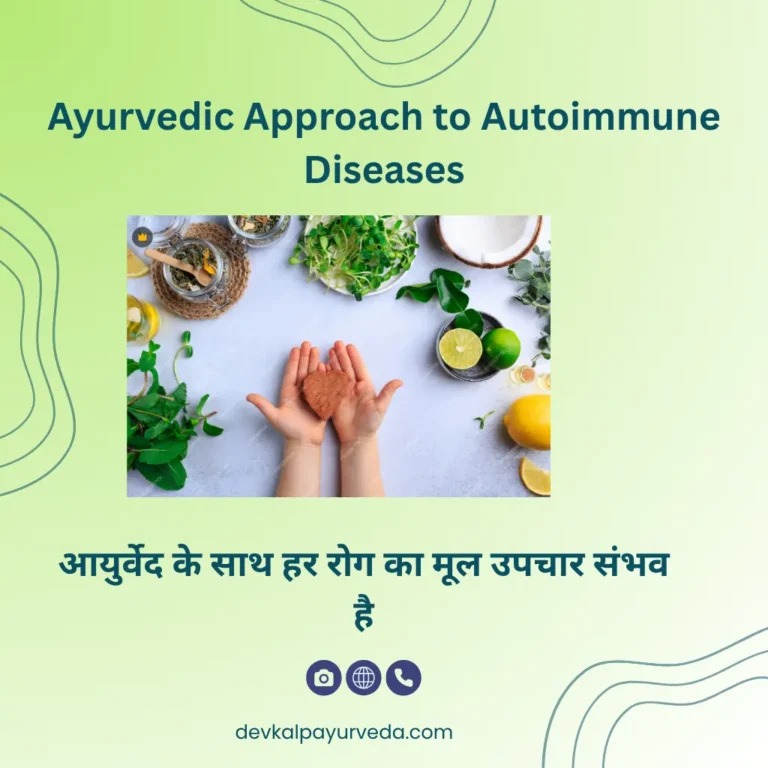Ayurvedic Approach to Autoimmune Diseases: Healing the Body Naturally
Introduction
Ayurvedic Approach to Autoimmune Diseases offers a time-tested, holistic way to heal the body naturally. In today’s fast-paced and stressful world, autoimmune diseases like rheumatoid arthritis, psoriasis, Hashimoto’s thyroiditis, and lupus are becoming increasingly common. These conditions occur when the body’s immune system mistakenly attacks its own healthy cells, leading to chronic pain, fatigue, and inflammation.
While modern medicine primarily focuses on managing symptoms through immunosuppressive drugs, Ayurveda takes a different path. Rooted in ancient wisdom, the Ayurvedic approach to autoimmune diseases emphasizes detoxification, balancing the doshas, strengthening digestion (Agni), removing toxins (Ama), and restoring the body’s natural immunity (Ojas). Instead of suppressing the immune system, Ayurveda aims to correct the underlying imbalances that trigger autoimmune reactions.
In this comprehensive guide, we will explore how Ayurveda addresses autoimmune diseases through therapies, herbs, diet, and lifestyle modifications that focus on long-term healing and wellness.
What Are Autoimmune Diseases?
Autoimmune diseases occur when the immune system mistakenly attacks the body’s own cells. Instead of protecting against viruses and bacteria, it becomes overactive and targets healthy tissues.
Common autoimmune conditions include:
-
Rheumatoid arthritis (RA)
-
Psoriasis
-
Hashimoto’s thyroiditis
-
Systemic lupus erythematosus (SLE)
-
Inflammatory bowel disease (IBD)
-
Type 1 diabetes
-
Multiple sclerosis (MS)
Common symptoms:
-
Chronic fatigue
-
Joint or muscle pain
-
Skin rashes
-
Digestive disturbances
-
Hair loss
-
Brain fog
While modern science identifies genetic, environmental, and hormonal factors, Ayurveda dives deeper into internal causes like Ama (toxins), Agni (digestive fire), and Dosha imbalances.
Ayurvedic View on Autoimmune Diseases
In Ayurveda, autoimmune diseases are primarily classified as:
-
Aamavata (RA-like condition)
-
Vatarakta (Lupus, joint issues)
-
Kustha (Psoriasis, eczema)
-
Grahani (IBD)
-
Vyadhi Kshamatva Hani (Immunity loss)
Core Ayurvedic concepts involved:
-
Ama (Toxins): Undigested food or emotions that block bodily channels.
-
Agni (Digestive Fire): Weak Agni leads to Ama buildup.
-
Tridosha Imbalance: Primarily Vata and Kapha disturbances.
-
Rakta Dhatu Dushti: Impaired blood tissue is a root in many autoimmune issues.
-
Ojas Depletion: Ojas is the essence of immunity; low ojas leads to poor resistance.
Ayurvedic Therapies for Autoimmune Healing
Ayurveda doesn’t treat the disease name — it treats the imbalance behind it. Depending on the body type (Prakriti), doshic imbalance, and strength of digestion, personalized therapies are given.
Shodhana (Cleansing Therapies):
Panchakarma is highly recommended:
-
Virechana (Therapeutic purgation) – Removes Pitta and toxins via the gut.
-
Basti (Medicated enema) – Especially for Vata-related autoimmune conditions.
-
Nasya (Nasal detox) – For disorders affecting the head or emotions.
-
Raktamokshana (Bloodletting) – In selected chronic skin conditions.
-
Abhyanga + Swedana (Massage + steam) – Loosens Ama and opens blocked channels.
Shamana (Palliative Therapies):
Used post-detox for long-term control.
-
Dosha balancing herbs
-
Anti-inflammatory formulations
-
Rasayana (rejuvenative tonics)
Powerful Ayurvedic Herbs for Autoimmune Disorders
Here are scientifically supported herbs used in Ayurveda:
| Herb | Benefits |
|---|---|
| Ashwagandha | Reduces stress & inflammation, modulates immunity |
| Guduchi (Giloy) | Detoxifier, adaptogen, boosts Ojas |
| Turmeric (Haridra) | Strong anti-inflammatory & antioxidant |
| Manjishtha | Blood purifier, helpful in psoriasis & skin issues |
| Guggul | Anti-inflammatory & detoxifying action |
| Shatavari | Supports hormonal & immune balance in women |
| Amla | High in Vitamin C, rejuvenates tissues |
These herbs are often used in formulations like:
-
Maharasnadi kwath
-
Amritarishta
-
Kaishore guggul
-
Triphala
-
Chyawanprash (Rasayana)
Ayurvedic Diet for Autoimmune Diseases
A clean, digestible, sattvic diet is key in autoimmune care.
Recommended Foods:
-
Warm, cooked vegetables
-
Mung dal khichdi
-
Steamed greens (like spinach, methi)
-
Cow ghee (small quantity)
-
Spices like cumin, turmeric, ginger, ajwain
-
Herbal teas (jeera water, ginger tea)
Foods to Avoid:
-
Dairy (especially curd at night)
-
Refined sugar
-
White bread/pasta
-
Nightshades (tomatoes, potatoes) for joint issues
-
Cold, raw, stale, or packaged foods
-
Heavy lentils (rajma, chana)
Ayurvedic Lifestyle for Immune Harmony
-
Wake up before sunrise (Brahma Muhurta)
-
Daily Abhyanga (oil massage) with sesame or coconut oil
-
Sun exposure + Pranayama
-
Meditation & Mantra chanting (Om, Mahamrityunjaya)
-
Digital detox to calm Vata
-
Early dinner (before sunset)
Scientific Research Supporting Ayurvedic Interventions
Modern studies are beginning to validate Ayurvedic herbs:
-
Ashwagandha shown to reduce C-reactive protein and inflammation.
-
Curcumin proven effective in RA and ulcerative colitis.
-
Giloy extract found to modulate T-cells in immune diseases.
Case Study: A 38-year-old female with Hashimoto’s thyroiditis saw significant reduction in TSH and fatigue after 3 months of Panchakarma + Rasayana therapy at Devkalp Ayurveda.
Panchakarma Therapy for Chronic Diseases
Conclusion
Autoimmune diseases can make life difficult — but healing doesn’t always have to mean harsh medicines and lifelong dependence.
Through its detoxification, personalized healing, natural herbs, and mind-body alignment, Ayurveda offers a powerful approach to autoimmune disorders. Rather than suppressing the immune system, it brings it back into balance.
✅Want to begin your Ayurvedic healing journey?
Contact Devkalp Ayurveda today for a personalized consultation.
FAQs
Ayurveda helps manage and reduce symptoms by addressing root causes. Complete reversal is possible in early stages with lifestyle change.
Never stop allopathy without consulting your doctor. Ayurveda can complement your treatment safely.
Usually 4–12 weeks depending on severity and consistency in treatment.
Yes, especially Virechana and Basti are effective in long-standing inflammation.
When taken under expert guidance, herbs are generally safe. Avoid self-medication.


